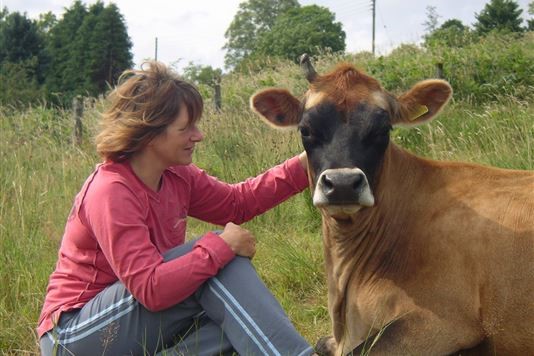WWOOFing: how you could become an organic farmer for a few weeks

Despite now being a global scheme, WWOOFing isn’t all that well known. Here's what it is and how it works.
When Lovefood recently wrote about Community Support Agriculture projects, the term ‘WWOOFing’ often popped up. But what is WWOOFing?
For a start, it has absolutely nothing to do with dogs. It’s a volunteer scheme that gives people the chance to live a different life for a few weeks on an organic farm.
In 1971, a secretary living and working in London kickstarted an environmental movement which would grow into a worldwide organisation. Sue Coppard wanted to give people like herself, living in urban areas, the opportunity to experience life in the countryside, so she arranged a working weekend for a group at a biodynamic farm in Sussex.
That was the first weekend which spurred the growth of ‘Working Weekends On Organic Farms’, or 'WWOOF'. Although the acronym, taking into account the global nature of modern WWOOF, now stands for ‘World Wide Opportunities On Organic Farms’.
Hosts and volunteers
The arrangement is fairly straightforward. People who want to learn about organic farming can sign up for membership with a WWOOF organisation, and then choose from a list of hosts. In return for the hours put in by the volunteer, the host gives them a place to sleep and feeds them. This non-monetary exchange, based on trust, is the founding ethos behind the scheme.
Scarlett Penn of WWOOF UK says that many people do it to develop their farming skills: "There's a big upswing in public interest in organic farming and green living, and an increasing number of people living in cities who want to spend more time in the countryside."

Some people, says Scarlett, are looking to buy their own smallholdings, but they don’t have “the knowledge or skills to run them.” WWOOFing can act as a stepping stone to empower those people.
For others, it’s a scheme used as a method of “meaningful travel”. People want to get to know a network of like-minded people around the world, as well as learn new things and hone their skills.
WWOOF: a global scheme
WWOOF now has organisations in over 100 countries now throughout Europe, Asia, Australasia and both North and South America. Some countries lack their own national organisations, but there are 429 hosts in these places, co-ordinated by WWOOF Independents.
The most recent countries to join, in 2012, were Togo, Kenya and Norway. In the early days, the UK was joined first by New Zealand (1973), then Australia in 1981, followed by Canada in 1985. There was then a steady expansion of the program across the globe in the 1990s and 2000s. Australia currently has the most hosts, and the most volunteers.
Accessibility & money
Regular financial commitments such as rent or mortgage payments act as barriers for people who want to go and learn new skills. And if you're a low-income city worker, fitting volunteering into your schedule might be hard.
However, Scarlett says that people in full-time work often fit WWOOFing into their schedules as an affordable holiday in the country. Since accommodation and food is supplied by the host, the costs can be fairly low for the volunteer.

Membership fees are pretty cheap at £20 a year, and they entitle you to WWOOF 365 days a year if you want to. “In theory, apart from travel costs between hosts, you don’t actually need money,” she says. Some hosts, however, do give their WWOOFers a little bit of money so they have something to spend.
Environmental considerations
Scarlett points out that you have to ask questions of a scheme that encourages people to fly around the world. Surely, their contribution to a positive environmental outcome is limited by the carbon footprint their travel leaves?
WWOOF UK wants to put an emphasis on home country-based volunteering, and are planning group events in the UK to build connections between farmers and WWOOFers. Regular meet-ups are on the horizon, where volunteers can learn skills as part of a like-minded group without having to travel the globe to find such an opportunity.
Are there any problems?
While researching WWOOFing, I came across a couple of blogs depicting bad experiences. One blogger worked for 12 hours a day on a farm, without learning what she really wanted to, while another did 13 hours a day, without days off, and was provided with mouldy food.
What they both mention (along with the better times they'd had), and what Scarlett also reinforces, is the importance of good communication between volunteers and their hosts.
Although WWOOF guidelines recommend a fair trade would be four to six hours of work a day in exchange for bed and board, Scarlett says that if a farm and a WWOOFer agree that the working hours will be longer, that’s not a problem.

“If the host is clear about it,” she says, “it represents a great chance for someone to go along and learn as much as they want about biodynamic farming. The point is, everything is taken case by case and it normally centres on communication."
So long as everyone has the same expectations, set out beforehand, the outcome will be a happy one. If a host doesn’t take care of their volunteers, then the co-ordinator of the country’s WWOOF program can step in.
Would you be interested in WWOOFing, or do you know someone who would? Do you think the exchange between volunteers and hosts is fair? Let us know your thoughts in the Comments below.
Pictures courtesy of WWOOF UK.
You might also be interested in:
The benefits of farming together
Comments
Be the first to comment
Do you want to comment on this article? You need to be signed in for this feature